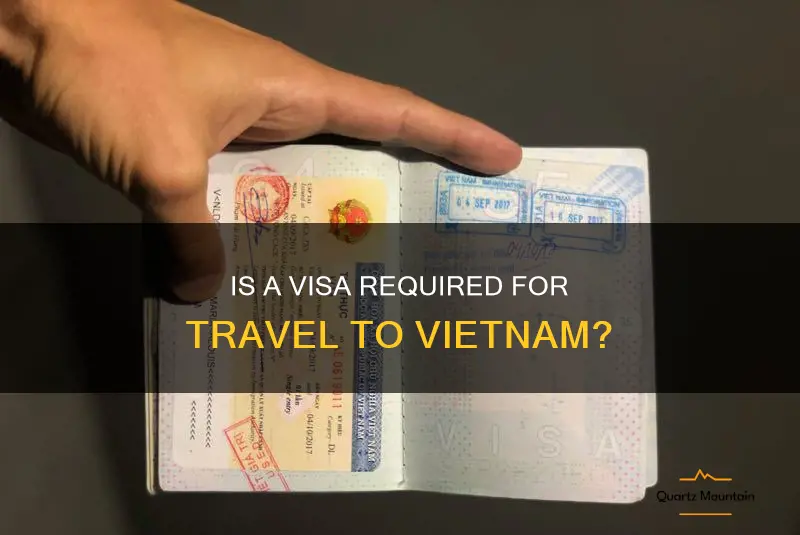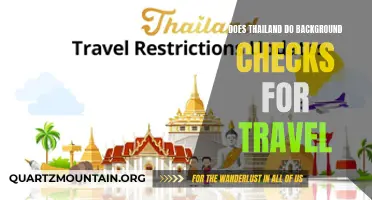
Have you ever wanted to explore the vibrant culture and breathtaking landscapes of Vietnam? If so, you may be wondering if a visa is required for travel to this Southeast Asian country. As a popular tourist destination, Vietnam attracts millions of visitors each year, and understanding the visa requirements is essential before embarking on your adventure. In this article, we will explore whether a visa is needed and provide you with all the information you need to know to ensure a smooth and hassle-free journey to this fascinating country.
| Characteristics | Values |
|---|---|
| Passport Validity | At least 6 months |
| Visa Validity | Up to 1 year (single entry) or 3 months (multiple entry) |
| Visa Exemption | For citizens of certain countries for a specific duration |
| Visa on Arrival | Available for eligible travelers |
| Visa Fee | Varies based on duration and type of visa |
| Visa Processing Time | Normally takes 2-3 working days |
| Required Documents | Passport, visa application form, passport-sized photos, visa fee |
| Visa Application Centers | Vietnamese embassies/consulates or online |
| Visa Extension | Possible for an additional stay |
| Visa-Free Travel | Allowed for certain border areas for up to 15 days |
What You'll Learn

Visa requirements for traveling to Vietnam for tourists
Vietnam is a popular tourist destination known for its stunning natural landscapes, rich history, and vibrant culture. If you are planning a trip to Vietnam, it is essential to be aware of the visa requirements to ensure a smooth and hassle-free travel experience. Here, we will provide all the information you need to know about visa requirements for traveling to Vietnam as a tourist.
Most visitors to Vietnam require a visa to enter the country. There are a few exceptions to this rule, including citizens of certain countries who are exempt from a visa for a specific duration. Citizens of countries such as Japan, South Korea, Sweden, Finland, Norway, Denmark, Russia, and Belarus can enter Vietnam without a visa for a maximum of 15 days.
If you do require a visa, there are two main ways to obtain it: through a Vietnam embassy/consulate or via an online visa application. The traditional method involves visiting a Vietnam embassy or consulate in your home country or a nearby country to apply for a visa. This process typically requires filling out an application form, submitting the necessary documents, and paying the visa fee. The processing time for embassy/consulate visas can vary, so it is recommended to apply well in advance of your travel dates.
However, a more convenient option for many travelers is the online visa application, known as the Vietnam e-visa. The e-visa is available for citizens of 81 countries, including the United States, Canada, the United Kingdom, Australia, and many European countries. With the e-visa, you can apply for your visa entirely online without the need to visit an embassy or consulate.
To apply for an e-visa, you need to visit the official website of the Vietnam Immigration Department and complete the online application form. You will need to provide personal information, travel details, and upload a scanned copy of your passport photo page. After submitting the application and paying the processing fee, which is typically around $25, you will receive an electronic visa approval letter via email within a few days. You must print out this letter to present it when you arrive in Vietnam to get your visa stamp.
It is important to note that the e-visa is only valid for single-entry trips of up to 30 days in Vietnam. If you plan to enter Vietnam multiple times or stay for longer than 30 days, you will need to apply for a different type of visa, such as a multiple-entry visa or a visa on arrival.
For those who are eligible for a visa on arrival, it is another convenient option. You can apply for a visa on arrival online through a reputable travel agency or visa service. After submitting the online application and payment, you will receive a visa approval letter via email. Upon arrival at one of Vietnam's international airports, you need to present this letter, along with your passport, two passport-sized photos, and the visa stamping fee. The visa stamp will be issued at the immigration desk, and you can proceed to enter the country.
It is essential to carefully check the visa requirements and regulations before traveling to Vietnam. Failure to have the appropriate visa may result in denied entry to the country or significant delays at the immigration checkpoint. To ensure a smooth travel experience, it is advisable to apply for your visa well in advance and have all the necessary documents prepared.
In conclusion, most tourists traveling to Vietnam require a visa to enter the country. There are various options available, including traditional embassy/consulate visas, e-visas, and visa on arrival. The specific visa requirements depend on your nationality, travel duration, and entry method. It is crucial to research and understand the visa requirements before your trip to Vietnam to ensure a hassle-free and enjoyable experience.
Understanding the Duration of Visa Waivers When Traveling to Iran
You may want to see also

How to obtain a visa for traveling to Vietnam
When planning a trip to Vietnam, it is important to understand the visa requirements for your nationality. In most cases, travelers will need a visa to enter the country. Fortunately, obtaining a visa for traveling to Vietnam is a straightforward process. In this article, we will guide you through the steps to obtain a visa for your trip.
There are different types of visas available for travel to Vietnam, including tourist visas and business visas. The most common type of visa for travelers is the tourist visa, which allows you to stay in Vietnam for a certain period of time for tourism purposes.
Here are the steps to obtain a tourist visa for Vietnam:
- Determine the type of visa you need: Before applying for a visa, you should determine the type of visa that is suitable for your travel plans. For most tourists, a single-entry visa will be sufficient. However, if you plan to leave and re-enter Vietnam during your trip, you may need a multiple-entry visa.
- Choose the method of application: There are two main ways to apply for a visa for Vietnam. You can either apply through the Vietnamese embassy or consulate in your home country or apply for an e-visa online. The e-visa is a convenient option as it allows you to apply from anywhere with an internet connection.
- Prepare the necessary documents: Regardless of the application method you choose, you will need to prepare certain documents to support your visa application. These typically include a completed visa application form, a valid passport with at least six months of validity remaining, a recent passport-sized photo, and the visa fee.
- Apply through the embassy or consulate: If you choose to apply through the Vietnamese embassy or consulate, you will need to physically visit their office or mail your application. Check the embassy or consulate website for specific instructions and requirements. It is recommended to apply well in advance of your travel dates to allow for processing time.
- Apply for an e-visa online: To apply for an e-visa, you will need to visit the official website of the Vietnamese government's e-visa system. Fill out the online application form, upload the required documents, and pay the visa fee online. After submitting your application, you will receive an application reference code, which you can use to track the progress of your e-visa.
- Receive your visa: Once your visa application is approved, you will receive your visa. If you applied through the embassy or consulate, you will need to collect your visa in person or have it mailed to you. If you applied for an e-visa, you can download and print your e-visa.
- Check your visa details: Before traveling, carefully check the details on your visa to ensure they are correct and match your passport information. Pay attention to the validity dates and the number of entries allowed.
By following these steps, you can obtain a visa for traveling to Vietnam and ensure a smooth entry into the country. Remember to check the specific visa requirements for your nationality, as they can vary. It is always recommended to apply for your visa well in advance of your travel dates to allow for any potential delays in processing.
How to Attend a Conference in France: A Guide to Obtaining a Travel Visa
You may want to see also

Exemptions and exceptions for visa requirements in Vietnam
Traveling to Vietnam can be an exciting and unforgettable experience. However, before planning your trip, it is important to understand the visa requirements to ensure a smooth and hassle-free journey.
In most cases, a visa is required for travel to Vietnam. However, there are certain exemptions and exceptions that you should be aware of. These exemptions and exceptions allow certain individuals to enter Vietnam without a visa or with a visa exemption for a predetermined period of time.
Visa Exemption for Citizens of Certain Countries:
Citizens of certain countries are eligible for visa exemption for a specific duration of stay in Vietnam. The duration of stay and the countries eligible for visa exemption may vary, so it is crucial to check with the Vietnamese embassy or consulate in your home country before traveling. Some of the countries that typically have visa exemptions for their citizens include:
- Japan: Visa exemption for up to 15 days.
- South Korea, Thailand, Malaysia, Singapore, Indonesia, and Cambodia: Visa exemption for up to 30 days.
- Finland, Denmark, Sweden, Norway, Russia, and Belarus: Visa exemption for up to 15 days if the previous visit to Vietnam has been at least 30 days prior to the new entry date.
- Philippines: Visa exemption for up to 21 days.
- United Kingdom, Germany, France, Spain, Italy, and Belarus: Visa exemption for up to 15 days for travelers holding a British, German, French, Spanish, Italian, or Belarusian passport with at least six months of passport validity.
Visa Exemption for APEC Business Travel Cardholders:
Holders of valid APEC Business Travel Cards (ABTC) endorsed with "VNM" are eligible for visa exemption for a stay of up to 90 days. This exemption is applicable to business travelers from countries including Australia, China, Japan, South Korea, the United States, and many others.
Visa Exemption for Diplomatic and Official Passports:
Holders of diplomatic or official passports from certain countries are exempt from obtaining a visa for their official or diplomatic visits to Vietnam. This exemption usually applies to government officials, diplomats, or individuals traveling on official government business.
Visa Exemption for Tour Groups:
If you are part of a tour group organized by an international travel company that has been approved by the Vietnam National Administration of Tourism, you may qualify for visa exemption. This exemption is applicable when traveling in a group and following an approved itinerary.
Visa Exemption for Children:
Children under the age of 14 who are included in their parents' passports are exempt from obtaining a separate visa for Vietnam. However, it is important to note that their passport should have at least six months of validity remaining at the time of travel.
It is essential to carefully review and understand the specific conditions and requirements for visa exemptions before traveling to Vietnam. The details mentioned above are subject to change, and it is always recommended to consult with the Vietnamese embassy or consulate in your home country or visit the official website of the Vietnamese immigration department for the latest information.
While visa exemptions provide convenience for certain travelers, it is important to remember that they have limitations in terms of duration, purpose of visit, and other conditions. If you do not fall under any of the exemption categories, you will need to apply for a visa in advance through the Vietnamese embassy or consulate in your home country or opt for an e-visa or visa on arrival option, if available.
By understanding and following the visa requirements and exemptions for Vietnam, you can ensure a smooth and hassle-free journey to this captivating Southeast Asian country.
Bringing your Newborn Child to America: Navigating the Visa Process
You may want to see also

Visa on arrival options for traveling to Vietnam
If you are planning a trip to Vietnam, one of the important things to consider is the visa requirements. Depending on your nationality, you may or may not need a visa to enter Vietnam. Fortunately, for those who do need a visa, there is a convenient option called "Visa on Arrival" that can make the process much simpler.
Visa on Arrival is a program that allows travelers to obtain their visa upon arrival at the airport in Vietnam. Instead of applying for a visa at the Vietnamese embassy or consulate in their home country, travelers can apply online for an Approval Letter that allows them to get their visa upon arrival.
To apply for a Visa on Arrival, you will need to follow these steps:
- Visit a reliable website that offers visa on arrival services. Make sure the website is legitimate and has good customer reviews.
- Fill out the online application form with your personal information, including your full name, passport number, date of birth, and arrival date. You will also need to provide your flight details and the purpose of your visit.
- Pay the visa processing fee online. The fee varies depending on the length of your stay and the type of visa you need.
- Wait for the Approval Letter to be sent to your email. This usually takes 2-3 business days, but some services offer rush processing for an additional fee.
- Print out the Approval Letter and prepare two passport-sized photos, your passport, and some cash in USD for the visa stamping fee at the airport.
- When you arrive in Vietnam, go to the Visa on Arrival counter at the airport. Present your Approval Letter, passport, photos, and cash to the immigration officers.
- Wait for your name to be called and your visa to be stamped in your passport. This process usually takes about 15-30 minutes, depending on the number of travelers.
It's important to note that Visa on Arrival is only available for travelers arriving by air at one of Vietnam's international airports (Hanoi, Ho Chi Minh City, Da Nang, or Nha Trang). If you are arriving by land or sea, you will need to apply for a visa in advance at the Vietnamese embassy or consulate in your home country.
Also, keep in mind that Visa on Arrival is only applicable for tourist and business purposes. If you plan to work or study in Vietnam, you will need to apply for a different type of visa.
In conclusion, if you need a visa to enter Vietnam, the Visa on Arrival option can be a convenient and time-saving solution. By following the steps outlined above, you can easily obtain your visa upon arrival at the airport and start enjoying your trip to this beautiful country.
Can F1 Visa Holders Travel to Canada?
You may want to see also
Frequently asked questions
Yes, a visa is required for travel to Vietnam for most foreign nationals.
You can apply for a Vietnamese visa at the nearest Vietnamese embassy or consulate or online through the official website of the Vietnam Immigration Department.
There are various types of visas available for travel to Vietnam, including tourist visas, business visas, and diplomatic visas. The type of visa you need depends on the purpose of your visit.
Yes, it is possible to obtain a visa on arrival in Vietnam if you are traveling by air and entering through one of the international airports in Vietnam. However, you need to apply for a visa approval letter online before traveling to Vietnam and present it to the immigration officer upon arrival.







